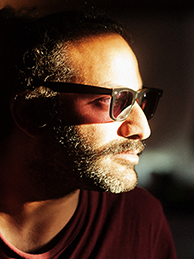Bio | Research
Yazan Khalili is a researcher, architect, visual artist, and cultural producer. Currently, he is a PhD candidate at the Amsterdam School for Cultural Analysis (ASCA) as part of the IMAGINART group, based at the University of Amsterdam (UvA). He received his BA degree in architecture from Birzeit University in 2003, a MA degree from the Centre for Research Architecture at Goldsmith’s College, University of London in 2010, and an MFA degree at the Sandberg Institute, Rietveld Academy, Amsterdam, in 2015. He was the artistic director of the Khalil Sakakini Cultural Centre in Ramallah from 2015-2019 and served as co-chair of the photography program at the MFA at Bard College between 2020 and 2022, during which period he was also in residence at the Rijksakademie in Amsterdam. He has curated and produced several exhibitions, including The City | The Image in 2012, The Long Journey (along with the UNRWA Audio-Visual Archive for Palestine refugees) in 2013, and co-curated Debt at as part of Qalandia International 2018. In 2015, he co-organized the ‘Walter Benjamin in Palestine’ symposium and ‘Marx: The Ultimate Contemporary’ in 2018. In 2020 he co-founded Radio Alhara, a communal online station. His works have been exhibited in several major solo and collective exhibitions, among others: documenta fifteen 2022; KW, Berlin 2020; MoCA, Toronto 2020; New Photography, MoMA 2018; Jerusalem Lives, Palestinian Museum, 2017; Shanghai Biennial, 2016; Sharjah Biennial, 2013. His writings and photographs have been featured in several publications, including the e-flux journal, Assuming Boycotts, Kalamon, Race & Class.
Informal bio
Yazan believes in things that can’t be easily found: communal practices and support structures that distribute power and challenge existing structures. His beard is at once seen as that of a leftist and an Islamist; this, he thinks, is a sign of the problems of contemporary identity politics. He reacts to these problems by focusing on economic and cultural structures as a way of rethinking and producing politics. He is a slow reader but a fast learner who enjoys listening to podcasts. Given that he suffers while writing, he prefers talking, maybe because talking and listening are collective and communal acts. He follows his teacher’s advice: that any project whose aims fall short of changing the whole world is not necessary.
His artistic and cultural practice frames landscapes, institutions, and social and technological phenomena as politicized entities. He is interested in structures—institutional as well as others—especially how they are built and perform. This aspect of his work can be traced to his time leading the Khalil Sakakini Cultural Center in Ramallah, during which he was concerned to rethink the funding and foundations of this cultural institution in the context of settler colonialism.
Contact: Y.Khalili@uva.nl
